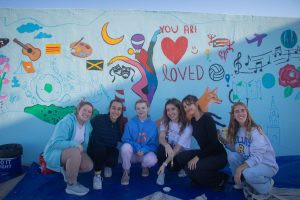The Bach Festival Society of Winter Park, Central Florida’s oldest classical music organization, opened its 2015-2016 season on Saturday afternoon with a program that celebrated the music of North and South America. If other orchestras have also billed recent programs as “Music of the Americas,” it is because there is a distinctive flavor to music written in America or influenced by American cultures.
Representing South America was the 1954 piece “Cantata Criolla”: two vocal soloists, chorus, and orchestra, set to music a Faustian tale with a typical South American spin. Venezuelan composer Antonio Estévez employed rich orchestral forces, antiphonal choral writing, and clearly stated melodies for the vocal soloists. Venezuelan singers Idwer Alvarez, tenor, and Juan Tomás Martínez, baritone, played the roles of Florentino and the Devil, respectively. Both soloists displayed full-blown bravura, polished clarity of tone, and arresting power of projection—enough to fill every corner of Rollins’ Knowles Memorial Chapel two times over.
“Cantata Criolla” progressed with careful attention to storytelling; the orchestra set the mood for the story of Florentino, a plainsman who is challenged to a singing duel by El Diablo. With call-and-response texture, the large chorus introduced Florentino as he rode along the flatlands to his fateful encounter with the devil. Each of the soloist entrances were short, which created tension and anticipation. Estévez’s melodies for the tenor and baritone are made of few, elongated notes, which left ample room for the singers to add flourishes and vibrato. Both Alvarez and Martínez added much to their parts.
The instrumental forces displayed penetrating clarity, often loud and raw—fittingly for the dramatic score. The percussion section was enhanced by xylophone, blocks, maracas, cymbals, and orchestra bells. The climactic orchestral clash that introduces “The Duel” was momentous; the cymbal crash resonated fiercely and set a screeching background for the ensuing duel. As the section progressed, the mood of the piece shifted to a lilting South American dance rhythm, which oddly contrasted well against the heavy choral parts and the seriousness of the soloists.
The strength of “Cantata Criolla” was its superb handling of folk material from the composer’s country in the style of twentieth century modern music. Of course Florentino, our good plainsman hero, wins in the end, and so does Venezuela for representing the spirit of South America with this smart choral piece—a highlight among recent Bach Festival Society performances.
Though its composer was Czech, Dvořák’s Symphony No. 9, “From the New World,” was composed in the United States and heavily influenced by Native American music and spirituals. Conductor John Sinclair and the orchestra gave us a strong reading of this famous piece, with particularly powerful first and fourth movements.
Sinclair polished the obvious details that make a good performance: the first movement used subtle inflections in the strings, with crescendos that sounded as though the strings were slowly illuminated as they rose to majestic statements. The signature brass themes of the first and fourth movements were bold and hefty; the raw power they produced made for a thrilling performance. Sinclair also paid attention to the restatements and allusions to themes that have come before, which is one of the things that make the Dvořák symphony so memorable. In the finale, he seemed to place emphasis on the restatement by the low strings of the heroic brass theme from the first movement.
Something peculiar was the second movement: Sinclair seemed to have taken literally the ‘largo’ (very slow and broadly) tempo marking, particularly during the main theme. Although the group interplay did not falter, the famous English horn theme lost some of its character at such a slow pace.
Boasting some of the best the Bach Festival Society offers, “Music of the Americas” succeeded in presenting strong choral and instrumental forces, especially in the organization’s foray into music from South America.
All Bach Festival events are free for Rollins students, faculty, and staff members who present their R-card at the door (availability is limited). They can also reserve their free ticket before the event, together with a paid ticket for a guest. For upcoming performances, visit bachfestivalflorida.org







Be First to Comment